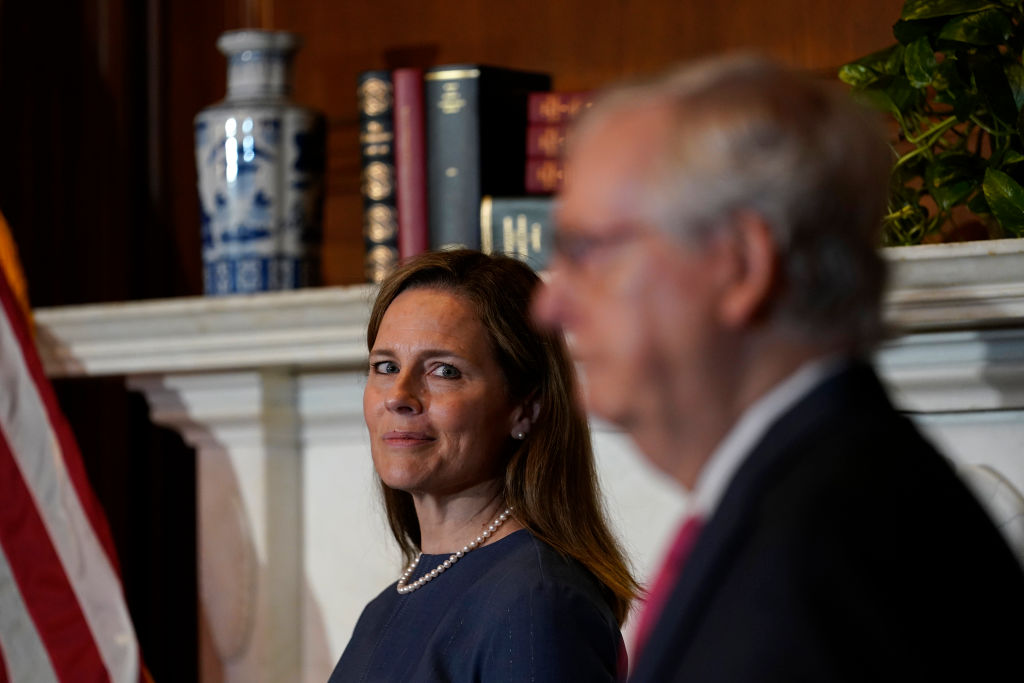Justice Amy Coney Barrett, in McConnell Center speech, insists the Supreme Court isn't 'partisan hacks'


A free daily email with the biggest news stories of the day – and the best features from TheWeek.com
You are now subscribed
Your newsletter sign-up was successful
Supreme Court Justice Amy Coney Barrett tried to draw a sharp line between "judicial philosophies" and "political parties" in a lecture Sunday night at the 30th anniversary celebration of the University of Louisville's McConnell Center. "My goal today is to convince you that this court is not comprised of a bunch of partisan hacks," she said.
Senate Minority Leader Mitch McConnell (R-Ky.) introduced Barrett, saying she is from "Middle America" and doesn't try to "legislate from the bench." Some of the students at the event asked Barrett, in written questions submitted beforehand, about the Supreme Court's 5-4 "emergency" order effectively banning almost all abortions in Texas and other "shadow docket" decisions with huge effects on policy with no public hearings or serious discussion. She said it would be "inappropriate" to comment on specific cases or "emergency" decisions generally.
McConnell founded the McConnell center in 1991 and, as Senate majority leader, pushed through Barrett's party-line confirmation a year ago, a little over a month after the death of Justice Ruth Bader Ginsburg and shortly before Republicans lost control of the White House and Senate in the 2020 election. Democrats had objected to Barrett's confirmation, citing among other things McConnell's argument four and a half years earlier that justices shouldn't be confirmed in the months before a presidential election.
The Week
Escape your echo chamber. Get the facts behind the news, plus analysis from multiple perspectives.

Sign up for The Week's Free Newsletters
From our morning news briefing to a weekly Good News Newsletter, get the best of The Week delivered directly to your inbox.
From our morning news briefing to a weekly Good News Newsletter, get the best of The Week delivered directly to your inbox.
McConnell's moves to deny President Barack Obama's nominee a hearing for months combined with pushing through Barrett's nomination a week before the 2020 election cemented conservative control of the Supreme Court for years or decades.
Barrett on Sunday argued that's not the right way to look at the high court. "The media, along with hot takes on Twitter, report the results and decisions" from the Supreme Court in a way "that makes the decision seem results-oriented," she said. "It leaves the reader to judge whether the court was right or wrong, based on whether she liked the results of the decision." She added that "sometimes, I don't like the results of my decisions. But it's not my job to decide cases based on the outcome I want."
A free daily email with the biggest news stories of the day – and the best features from TheWeek.com
Peter has worked as a news and culture writer and editor at The Week since the site's launch in 2008. He covers politics, world affairs, religion and cultural currents. His journalism career began as a copy editor at a financial newswire and has included editorial positions at The New York Times Magazine, Facts on File, and Oregon State University.
-
 The ‘ravenous’ demand for Cornish minerals
The ‘ravenous’ demand for Cornish mineralsUnder the Radar Growing need for critical minerals to power tech has intensified ‘appetite’ for lithium, which could be a ‘huge boon’ for local economy
-
 Why are election experts taking Trump’s midterm threats seriously?
Why are election experts taking Trump’s midterm threats seriously?IN THE SPOTLIGHT As the president muses about polling place deployments and a centralized electoral system aimed at one-party control, lawmakers are taking this administration at its word
-
 ‘Restaurateurs have become millionaires’
‘Restaurateurs have become millionaires’Instant Opinion Opinion, comment and editorials of the day
-
 Ex-South Korean leader gets life sentence for insurrection
Ex-South Korean leader gets life sentence for insurrectionSpeed Read South Korean President Yoon Suk Yeol was sentenced to life in prison over his declaration of martial law in 2024
-
 Rubio boosts Orbán ahead of Hungary election
Rubio boosts Orbán ahead of Hungary electionSpeed Read Far-right nationalist Prime Minister Viktor Orbán is facing a tough re-election fight after many years in power
-
 Key Bangladesh election returns old guard to power
Key Bangladesh election returns old guard to powerSpeed Read The Bangladesh Nationalist Party claimed a decisive victory
-
 Epstein files topple law CEO, roil UK government
Epstein files topple law CEO, roil UK governmentSpeed Read Peter Mandelson, Britain’s former ambassador to the US, is caught up in the scandal
-
 Iran and US prepare to meet after skirmishes
Iran and US prepare to meet after skirmishesSpeed Read The incident comes amid heightened tensions in the Middle East
-
 EU and India clinch trade pact amid US tariff war
EU and India clinch trade pact amid US tariff warSpeed Read The agreement will slash tariffs on most goods over the next decade
-
 Israel retrieves final hostage’s body from Gaza
Israel retrieves final hostage’s body from GazaSpeed Read The 24-year-old police officer was killed during the initial Hamas attack
-
 China’s Xi targets top general in growing purge
China’s Xi targets top general in growing purgeSpeed Read Zhang Youxia is being investigated over ‘grave violations’ of the law
